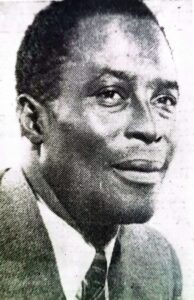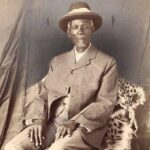ASAFU-ADJAYE, EDWARD OKYERE
- 5 Min Read
Sir Edward Okyere Asafu-Adjaye (1903-February 27, 1976), the first Asante lawyer, was also a politician and diplomat, and became Ghana’s first High Commissioner to the United Kingdom after independence in 1957.

PHOTO CAPTION: Asafo Agyei (Asafu-Adjaye). SOURCE: EA Library
The son of Mr. and Mrs. B. C. Asafu-Adjaye, he was born at Calabar in Nigeria, where his father was then working. He came from an Asante royal family, and his father became the Adontenhene (commander of the vanguard of the army). He was educated at the Kumase Government Boy’s School, the Society for the Propagation of the Gospel (S.P.G.) Grammar School (now Adisadel College) Cape Coast, and University College, London, where he obtained Bachelor of Arts and Bachelor of Laws degrees in 1925 and 1926 respectively. In January 1927 he was called to the bar at the Inner Temple, having won the Profumo prize. Before 1920, no Asante had been abroad for higher education. Edward Asafu-Adjaye and his elder brother, Isaac, were to be the first from Asante to break this precedent.
Returning home in early 1927, he served his law pupillage in the chambers of Sir Henley Coussey in Accra. While he made a good impression on all with whom he came into contact, he could not practise in, Asante, because under the existing system lawyers could not practise in the courts. He therefore had to practise in Accra until 1935, when the passage of the Courts Ordinance enabled him to transfer to Kumase, where he established the Adonten Chambers.
While in Accra, however, he remained in close touch with Asante, and discussed issues affecting the future of Asante with his friends and acquaintances. He played a leading part in the agitation for the unification of Asante and the Colony. He was one of two members who represented the Asante on the 1934 delegation which went to England to protest against the Sedition Bill, which extended the definition of sedition, and the Waterworks Bill, which sought to shift responsibility for the costs of the water supply in coastal cities from the government to the citizens.
It was he who explained the implications of the Sedition Bill, pointing out that the Asante Kotoko Society, an influential organisation of educated Asante, could be prosecuted as a seditious society” under the new legislation. Although the 1934 delegation failed in its mission, the role played by Asafu-Adjaye and the forceful arguments he advanced before the British Secretary of State for the Colonies were commended by his contemporaries.
When the Asante Confederacy was established by the British colonial administration in 1935, Asafu-Adjaye was among the five extraordinary members appointed to serve on the Confederacy Council in an advisory capacity. He remained a member for more than 15 years. He also served on the Kumase Town Council when it was established in 1943. In July 1946, when the Burns Constitution which united Asante and the Colony in one legislature, was promulgated, Asafu-Adjaye entered the legislature as an Asante Confederacy Council representative. In 1951 he was renominated to the Legislative Assembly by the Council, subsequently becoming Minister of Local Government in the first government (1951-54) of Kwame Nkrumah.
With his varied legal experience and his deep insight into the operation of the traditional system in the country, he was able to implement the new Local Government Ordinance of 1951, which replaced the former native authorities with some 250 local and urban councils. Despite some modifications over the years, the innovations introduced by Asafu-Adjaye are still the basis for local government in Ghana. In 1954 he was re-elected to the Legislative Assembly as the member for Kumase of Kwame Nkrumah’s Convention People’s Party (C.P.P.), and continued to serve as Minister of Local Government. In 1955 he was made Minister of Trade and Labour.
In 1957, after independence, he was appointed as Ghana’s first High Commissioner to the United Kingdom, as well as Ambassador to France. His contribution as a diplomat, as well as his charm, sagacity, and persuasive advocacy of the interests and policies of the Ghana government, were duly recognised when in 1960 he was knighted by Queen Elizabeth II. He retired in 1961, and returned to private practice at home.
Over the years he served on a number of delegations. He had represented the Gold Coast at the coronation of King George VI in 1937, and of Queen Elizabeth II in 1953. In 1949 he attended the Commonwealth Parliamentary Conference in Ottawa, Canada. He led Ghana’s delegations to the Conference on the Law of the Sea (1958) and to the Vienna Conference on Diplomatic Intercourse and Immunities (1961). In the earlier 1960s he also served on a United Nations committee concerned with apartheid in South Africa, and on a commission appointed by the British government to enquire into disturbances in British Guiana (now Guyana). In 1967 he was appointed chairman of the commission which enquired into, and exposed, the conditions prevailing, in Ghana prisons under the Nkrumah administration. He was also a member of the University College Council, Legon, and a director of Barclays Bank (Ghana) Ltd., Mobil Oil (Ghana) Ltd., and the Consolidated African Selection Trust Ltd., and was president of the African Liberal Council in Accra.
S. K. B. ASANTE



